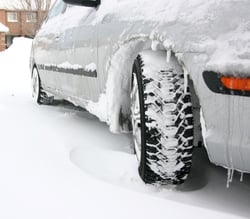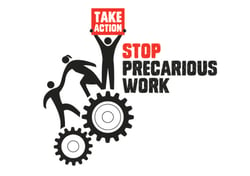Yes, perhaps an odd title for a posting. I was on my way back home from meeting downtown with Alberta Government colleagues who also work in the poverty reduction arena and I heard this call-in show about winter tires, and more to the point, about whether or not winter tires should be mandatory.
They are mandatory in Quebec now, but even in some provinces without a mandatory requirement, more than 80% of drivers have winter tires. Not so in Alberta, where the percentage is just over 50%. I'm not sure about other low percentage-provinces, but here is what went through my mind.
The folks that called in didn’t all agree, but I got the impression that most were for making it a legal requirement to have winter tires, and my impression of the radio interviewer and guest was that they agreed. I get that. It makes sense, right, that all of us would require one another to do this. It’s safer. Winter tires stop a car better than all season tires.
 I have never owned winter tires, but could afford them if I chose to buy them or was required to; though, being forced to dole out $1,000 for a new set of tires, and then pay more for rims and the ongoing costs of changing and balancing each season – well, the “Albertan” in me just doesn’t want to be forced to do that.
I have never owned winter tires, but could afford them if I chose to buy them or was required to; though, being forced to dole out $1,000 for a new set of tires, and then pay more for rims and the ongoing costs of changing and balancing each season – well, the “Albertan” in me just doesn’t want to be forced to do that.
But all of the above is not really why I wrote this post.
While I was listening to the radio show, it hit me that this radio engagement of citizens around winter tires was one more example of how a certain segment of the population is marginalized, not really considered, and in a sense, is relegated as a second-class citizen.
I am talking about people living in poverty or on the edge of poverty, workers who are precariously employed, earning poverty-producing wages and who do not have basic benefits that the rest of us take for granted: sick days, vacation leave, and employers committed to worker safety. We have a rising number of low income workers in our society. In fact, Canada has the highest rate of low income workers in the world.
 When I was listening to this radio show, I wondered to myself if any of these people would be in favour of mandatory winter tires knowing full well they cannot afford them. It’s not that they would be anti-winter tires per se, but who is going to push for legislation that requires an outlay of money they cannot afford?
When I was listening to this radio show, I wondered to myself if any of these people would be in favour of mandatory winter tires knowing full well they cannot afford them. It’s not that they would be anti-winter tires per se, but who is going to push for legislation that requires an outlay of money they cannot afford?
Mandatory winter tires may increase safety and reduce accidents, and of course I am for that, but do we really know if the societal benefits are sufficient to not care about the financial impact on millions of Canadians?
Could this be an example of those of us who can afford such legislation further pushing those on low income, deeper into the hole, with an ever decreasing chance of rising up to a better standard of living?
Low wage workers often need a car to get to and from work. Even families on welfare may need a car to ensure they can get their kids to the doctor, seek work, and not be left to isolation from community. I know. Some will say, people on welfare should not have cars, period. That perspective is what I call a “punitive ideology” that simply discounts or ignores the need for people, no matter their income, to get around.
Despite examples that welfare critics wag on about, such as seeing someone leave the food bank and drive away in a late model car, in my experience with people who are living poor, is that if they do have a car, it is more likely to be clunkier than anything the rest of us would drive.
Mandatory winter tires may decrease insurance costs, but so far the discounts are not all that great. A driver may see a return of 5%, but the main beneficiaries are car and tire manufacturers - the K-Tires and Canadian Tires of the world - and likely insurance companies. Mandatory winter tires come at the expense (no pun intended) of hard working people who are just getting by. Paying the price of winter tires is another burden they may not be able to carry.
Public policy and regulations, such as mandatory winter tires, when left to the decision of the “haves”, will invariably ignore or sidestep the “have-nots” or the “barely haves.” To be honest, I am not sure of what the answer should be regarding winter tires being made mandatory, but for example, if Alberta decided to implement this regulation, what would be done to ensure that low income workers who need a car to work, can actually get to work? Or would we feel okay about pricing this segment of the population out of the job market and paying them through welfare?
Food for thought, I think, on how society is keeping wages low while wanting all of us to pay more for things. There has to be a tipping point somewhere, doesn’t there?





